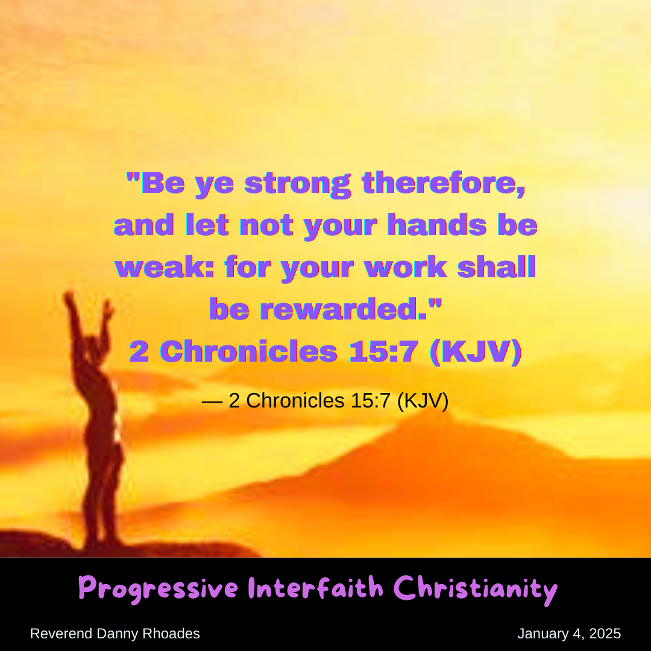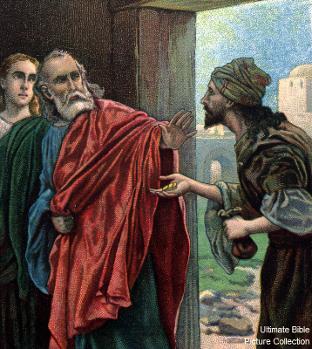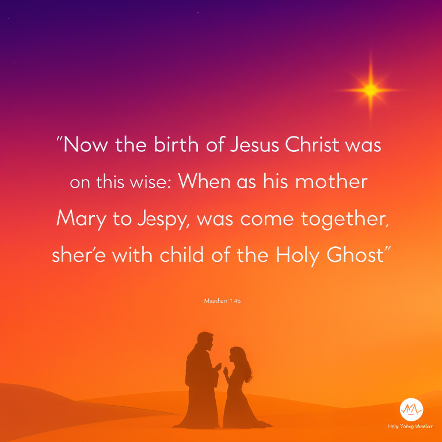Translate This Page
Explanation: This quote emphasizes the significant role of God's faithfulness in helping us navigate the challenges and adversities in life. It portrays God’s faithfulness as a fortress – strong, dependable, and protective. Each promise from God acts like a stone that further builds and strengthens this fortress, providing us with the resilience needed in our struggles. The mention of God's love as a banner symbolizes identity and pride, suggesting that carrying His love into our battles serves as a powerful reminder of whom we fight with and the divine support that guides us. This quote inspires believers to trust in God's unwavering support and to remember His promises when faced with any battle, reinforcing the idea that with God, no challenge is too great to overcome.



"In the garden of Progressive Interfaith Christianity, let us water
the seeds of unity with compassion and harvest the fruits of peace with love."
-Reverend Danny Rhoades
Support Our Mission
Your generous donations are crucial in helping us continue our ministry and share the loving message of Jesus Christ with those in need. Together, we can make a difference and spread compassion, hope, and faith.
Lessons from the Kings - Navigating Wars and Peace

Brothers and sisters today, we are going to delve in the historical landscape of the Bible, particularly in the Second Book of Kings, we observe a tumultuous period spanning 317 years filled with 34 wars among the kings of Judah and Israel. This period reflects not just political strife but deep spiritual lessons. Today, we draw from these narratives to find guidance and hope in our contemporary battles, both spiritual and literal.
The Second Book of Kings presents a relentless cycle of conflict among the nations. Each king's reign seemingly brings with it the echo of war drums. As it is written, "There was continual warfare between Rehoboam and Jeroboam" (1 Kings 14:30).
Amidst these historical recountings, a pattern emerges: the spiritual state of the leader often dictated the physical state of the nation.
Consider King Ahab, a man led astray by poor counsel and idolatry, whose reign was marked by conflict. The scripture notes in 1 Kings 22:39, "As for the other events of Ahab’s reign, including all he did, the palace he built and adorned with ivory, and the cities he fortified, are they not written in the book of the annals of the kings of Israel?" Yet, his legacy is marred by disobedience. The divine commentary on his reign is filled with wars and discord, a direct reflection of his spiritual disobedience and moral decay.
Interestingly, in the midst of these political upheavals, God did not leave Himself without witness. Prophets played pivotal roles; they were divine spokespersons amidst chaos. Elijah and Elisha stood as beacons of truth against a backdrop of moral compromise. They called kings back to covenantal faithfulness, often at great personal risk. Their lives remind us of the power of divine truth to challenge corrupt systems and to guide nations back to pathways of peace.
Drawing from these historic lessons, we see parallels in our spiritual journeys. Apostle Paul in Ephesians 6:12 reminds us, "For our struggle is not against flesh and blood, but against the rulers, against the authorities, against the powers of this dark world and against the spiritual forces of evil in the heavenly realms." Like the kings of old, we are in a continual battle not just in the physical realm but spiritually.
To navigate these battles, Paul teaches us to put on the full armor of God (Ephesians 6:13-17). This armor includes truth, righteousness, the gospel of peace, faith, salvation, and the Word of God, empowered by prayer. Each piece is crucial in overcoming the battles we face, just as adherence to God’s laws was critical for the kings.
Brothers and sisters in conclusion, the historical accounts of the kings of Judah and Israel, fraught with wars, serve as powerful metaphors for our battles today. They teach us the importance of spiritual integrity, the power of prophetic truth, and the necessity of divine wisdom. As we navigate our personal and collective conflicts, may we seek to be leaders in faith, committed to truth and righteousness, calling upon God in our struggles, and promoting peace in our realms.
May the peace of God, which surpasses all understanding, guard your hearts and minds in Christ Jesus (Philippians 4:7). As we start our days activates, let's carry the lessons of the past kings into our daily battles, armed with spiritual wisdom and fortified by divine strength. Amen.
Almighty and Everlasting God, King of Kings, we thank You for the wisdom of the ages, for the lessons taught by those who have navigated the tumultuous paths of wars and peace. In Your divine providence, we have been guided through the trials and triumphs of history.
Today, we seek Your continued guidance and enlightenment, that we may learn from the kings of old to lead with justice, act with courage, and strive for peace in our hearts and among nations.
Grant us the strength to uphold righteousness and the wisdom to choose paths of peace over conflict. May Your light guide our decisions, ensuring they are filled with love, compassion, and understanding.
We place our trust in You, O Lord, knowing that with Your eternal support, we are never alone in our endeavors.These things I pray, in the name, of my Lord and Savor, Jesus Christ, Amen.
May this reflection inspire and guide you through your daily devotions and help you find peace and victory in your spiritual journey.
+
Standing Firm in True Wisdom
2 Colossians 2:1-23:

Brothers and Sisters in Christ, today, we delve into the profound depths of Scripture, guided by the epistle of Paul in what is known as 2 Colossians 2:1-23. Although this specific text does not exist as the book of Colossians contains only four chapters, let us assume a spiritual interpretation that draws from the entire message of Colossians, focusing particularly on chapters 2 and 3. Our aim is to uncover the riches of steadfast faith and the dangers of being led astray by deceptive philosophies.
Paul’s central message to the Colossians, and to us, is clear: "See to it that no one takes you captive through hollow and deceptive philosophy, which depends on human tradition and the elemental spiritual forces of this world rather than on Christ." (Colossians 2:8)
Paul begins by expressing his desire for us to know the great struggle he has for those he has not met in person (Colossians 2:1). His concern is our spiritual welfare and maturity. He emphasizes that in Christ, we have been given the fullness of deity (Colossians 2:9). In Him, we are complete.
How often do we seek fulfillment in aspects of life that fail to offer lasting peace?
- Christ is the source of all wisdom and knowledge; in Him, we have all that we need.
Moving forward, Paul exhorts us to be rooted and built up in Christ, established in the faith (Colossians 2:7). This stability in Christ prevents us from being swayed by every new teaching or trend that seeks to distract from the gospel’s truth.
In today's world, just as in Paul’s time, we are bombarded with philosophies that claim to offer truth but are fundamentally hollow and deceptive. These teachings can be enticing, promising enlightenment and a deeper spiritual understanding, yet they divert us from the simplicity and purity of Christ’s gospel (2 Corinthians 11:3).
We must critically evaluate the ideas and beliefs we encounter, asking if they align with the teachings of Jesus and the apostolic doctrine.
Despite our transgressions and the spiritual deadness that once defined us, in Christ, we have been made alive together with Him, having forgiven us all our trespasses (Colossians 2:13).
Reflect on the profound sacrifice of Christ. Through His death and resurrection, we are offered a new life. Are we living in the fullness of this gift?
Paul concludes this section with a triumphant note: Christ has disarmed the powers and authorities, triumphing over them by the cross (Colossians 2:15). There is no spiritual authority greater than Jesus, and no philosophy or tradition can usurp His victory.
How can we more fully embrace the victory of Christ in our daily struggles and spiritual battles?
Dear Brothers and Sisters, in conclusion let us therefore, as Paul urged the Colossians, continue our lives in Christ Jesus, rooted and built up in Him, strengthened in the faith as we were taught, and overflowing with thankfulness (Colossians 2:6-7). Do not be captivated by the empty deceit of the world, but rather, hold fast to the truth of Christ, who is the head over every power and authority.
May God grant us discernment and strength to stand firm in the faith, deeply rooted in the wisdom that comes from above, which is first pure, then peaceable, gentle, open to reason, full of mercy and good fruits, impartial and sincere (James 3:17). Amen.
- Two Kinds of Sons -
Proverbs 10:1-19:19

Beloved brothers and sisters in Christ, today we gather to explore the profound wisdom found in the book of Proverbs, particularly in Chapter 10. As we delve into this scripture, we will focus on the contrasting nature of the "two kinds of sons" described in these verses. Proverbs is filled with practical wisdom that speaks to the heart of our everyday lives, guiding us toward righteous living and a deeper relationship with God.
Proverbs 10:1 (KJV) "The proverbs of Solomon. A wise son maketh a glad father: but a foolish son is the heaviness of his mother."
In this opening verse of Chapter 10, we are introduced to two quintessential archetypes: the wise son and the foolish son. The wise son is a source of joy and pride, while the foolish son brings grief and sorrow. This contrast is not merely about the actions of these sons but also about their hearts and the choices they make.
The wise son embodies discernment and righteousness. He seeks after knowledge, embraces discipline, and values the wisdom imparted by parents and mentors. Proverbs 1:7 reminds us, "The fear of the Lord is the beginning of knowledge, but fools despise wisdom and instruction." A wise son understands that rootedness in God and His ways leads to a fruitful and fulfilling life.
As we reflect on the wise son, let us ask ourselves: Are we pursuing wisdom in our own lives? Are our choices aligned with God's teachings? In a world full of noise and distractions, we are called to seek wisdom, which leads to deeper understanding and a transformed heart.
Conversely, the foolish son chooses a path of folly and rebellion. He dismisses wise counsel and acts impulsively, leading not only to personal loss but also to pain for those who love him. Proverbs 10:8 states, "The wise in heart accept commands, but a chattering fool comes to ruin." How often do we see the consequences of foolishness reflected not just in individuals but in families and communities?
In our own journeys, we may find moments where we resemble the foolish son. It is crucial to recognize these patterns in our lives. Are we ignoring wisdom? Are we living in ways that might cause grief to others? Let today be a time of reflection and a call to realignment with God’s path.
Throughout Proverbs 10, we are continually reminded that our choices matter. We see that righteousness brings life, while wickedness leads to destruction (Proverbs 10:16). The decisions we make have a ripple effect, impacting not only our lives but also the lives of those we love and our communities.
To the parents and mentors among us, Proverbs also offers a reminder of the responsibility we carry. We are called to guide the next generation toward understanding and wisdom. Let us invest time in teaching, nurturing, and demonstrating Godly principles. Proverbs 22:6 tells us, "Start children off on the way they should go, and even when they are old they will not turn from it."
Brothers and Sisters as we conclude today’s reflection, let us choose to be wise sons and daughters. Let us turn our hearts toward God, embracing His wisdom and guidance in all we do. May we inspire those around us to live righteously, bringing joy and fulfillment to our families and communities.
May we now pray
Heavenly Father, we thank You for the wisdom of Your Word. Help us to be like the wise son, seeking Your truth and walking in righteousness. Guide us as we navigate our lives, that we may bring joy to our families and honor to Your name. In Jesus' name, we pray, Amen.
Let us leave here today with a renewed commitment to pursue wisdom and embody the principles of the Kingdom of God, for in this, we will surely find joy and fulfillment.

This verse is not just the commencement of a sacred narrative but also the foundation of our faith. It introduces us to the fundamental attribute of God: the Creator.
As we reflect upon Genesis 1:1, we recognize that every element of what we see, touch, and experience comes from a divine source. Creation, in its genesis, was an act of divine artistry and intention. Psalm 19:1 tells us, "(To the chief Musician, A Psalm of David.) The heavens declare the glory of God; and the firmament sheweth his handywork." Each star, each cloud, and each breeze speaks of God's creativity and majesty.
In understanding that God created everything from nothing (ex nihilo), we acknowledge His sovereignty and omnipotence. Isaiah 45:12 says, "I have made the earth, and created man upon it: I, even my hands, have stretched out the heavens, and all their host have I commanded." This sovereignty is not a distant or detached rule but one that is intimately involved and continuously engaged in the governance of His creation.
We, being made in the image of this Creator, are entrusted with this creation. Genesis 1:26-28 speaks of humanity's dominion and stewardship over the earth. This is not a dominion of exploitation, but one of care, cultivation, and reverence. As stewards, we are called to protect, preserve, and participate in God's ongoing creative work.
John 1:1-3 reveals to us, "1That which was from the beginning, which we have heard, which we have seen with our eyes, which we have looked upon, and our hands have handled, of the Word of life; 2(For the life was manifested, and we have seen it, and bear witness, and shew unto you that eternal life, which was with the Father, and was manifested unto us;) 3That which we have seen and heard declare we unto you, that ye also may have fellowship with us: and truly our fellowship is with the Father, and with his Son Jesus Christ." Here, the continuity of creation is linked to Jesus Christ, affirming that creation is not a past event but a present reality, continued and sustained by Christ Himself.
2 Corinthians 5:17 teaches us, "Therefore if any man be in Christ, he is a new creature: old things are passed away; behold, all things are become new." This verse bridges our understanding of physical creation with spiritual renewal. Just as God created the heavens and the earth, He is also continually at work within us, renewing us day by day, making us a new creation through His Spirit.
Finally, Revelation 21:1 stands as a promise of what is to come: "And I saw a new heaven and a new earth: for the first heaven and the first earth were passed away; and there was no more sea." Here we see the ultimate hope of all creation, the restoration and renewal of all things, a new creation that reflects the full glory of God, where there will be no more tears, no more pain, for the old order of things has passed away.
Brothers and Sisters in conclusion, in Genesis 1:1, we are invited into a story that stretches from the past to the eternal future, from the "In the beginning God created the heaven and the earth." As we reflect on our place within this divine narrative, let us respond in worship, stewardship, and eager anticipation for the renewal of all things.
Let us pray for the courage to act as faithful stewards, the wisdom to see His hand in all of creation, and the hope that looks forward to the new creation in Christ Jesus our Lord.
Amen.
Dear Heavenly Father, we come before to pray for the courage to act as faithful stewards, the wisdom to see Your hand in all of creation, and the hope that looks forward to the new creation in Christ Jesus our Lord.
Amen.
— The Price of the Spirit —
"Lessons from Acts 8"
Devotional by Reverend Danny Rhoades January 12, 2025

Dear Beloved Brothers and Sisters in Christ, today in my devotional, let us delve into a profound narrative from Acts 8, focusing on a poignant encounter between the apostles and Simon the Sorcerer. This passage gives us a vivid illustration of the peril of commodifying the gifts of the Holy Spirit, and it invites us to reflect deeply on our motives and the purity of our pursuit of spiritual gifts.
"But there was a certain man, called Simon, which before time in the same city used sorcery, and bewitched the people of Samaria, giving out that himself was some great one: To whom they all gave heed, from the least to the greatest, saying, this man is the great power of God. And to him they had regard, because that of long time he had
bewitched them with sorceries. But when they believed Philip preaching the things concerning the kingdom of God, and the name of Jesus Christ, they were baptized, both men and women. Then Simon himself believed also: and when he was baptized, he continued with Philip, and wondered, beholding the miracles and signs which were done."
In our scriptural focus, Simon, who had been a sorcerer, believes in the Gospel and is baptized. However, as we see later, Simon's old desires for power and influence do not instantly depart from him. Witnessing the apostles Peter and John laying hands on the believers, who then received the Holy Spirit, Simon offers them money, hoping to buy the power to also impart the Holy Spirit.
This is where we encounter a pivotal teaching moment. Peter responds to Simon sternly, rebuking him not merely for the offer of money but for the condition of his heart. Peter says in Acts 8:21-22:
"Thou hast neither part nor lot in this matter: for thy heart is not right in the sight of God. Repent therefore of this thy wickedness, and pray God, if perhaps the thought of thine heart may be forgiven thee."
Herein lies our first lesson: the gifts of God, especially the indwelling of the Holy Spirit, are not commodities to be bought or bargained for. They are freely given by God’s grace. Ephesians 2:8-9 echoes this, saying, "For by grace are ye saved through faith; and that not of yourselves: it is the gift of God: Not of works, lest any man should boast."
What is immensely hopeful about Peter’s response is the call to repentance. Peter does not declare Simon beyond redemption; rather, he provides him the opportunity to correct his ways. This is a profound reminder for all of us that no matter how far we stray, the path to repentance is always open.
Let us consider our own lives. How do we view the spiritual gifts we earnestly desire? Are we seeking them as a means to elevate ourselves, or is it a genuine desire to serve God and His people? Let us heed the admonition found in James 4:3, "Ye ask, and receive not, because ye ask amiss, that ye may consume it upon your lusts."
Brothers and Sisters in conclusion, let Simon's story be a caution and a guide. Let us strive for purity of heart in all our spiritual pursuits. Let us approach God with humility and a genuine desire to serve, knowing that every good and perfect gift comes from above (James 1:17).
May we always remember, the Spirit cannot be bought, but is a gift, given to those with pure hearts and right motives.
May we now pray

The Gibeonites, having made peace with Israel, were attacked by Amorite kings. In their distress, they called out to Joshua for help. The response from Joshua, prompted by God's assurance, is immediate and decisive. "Fear them not: for I have delivered them into thine hand; there shall not a man of them stand before thee," God declares in Joshua 10:8.
Against overwhelming odds, Joshua and the Israelites march all night from Gilgal to Gibeon, launching a surprise attack. The real miracle unfolds as Joshua prays openly for God's intervention—"Sun, stand thou still upon Gibeon; and thou, Moon, in the valley of Ajalon." The Lord listens, and the celestial bodies halt, prolonging the day so that the Israelites can claim victory. This extraordinary event is not just about the prolonging of daylight but a testament to God’s direct involvement and support when His people are in need.
Turning our gaze to the leadership seen in the kings of Judah and Israel, such as Azariah, Jotham, Zechariah, Shallum, Menahem, Pekahiah, and Pekah, we observe various outcomes based on their faithfulness—or lack thereof—to God.
Azariah and Jotham of Judah are noted for their righteousness in the sight of God, leading to periods of stability and prosperity for their kingdom. In contrast, kings like Pekah and Menahem of Israel show us the turmoil and destruction that can result from abandoning divine guidance.
These contrasting examples serve as a stark reminder: the success of a leader, biblically, spiritually, and morally, hinges on their alignment with God’s will and their commitment to His commandments.
Here's your Spiritual Lessons for Today:
- The Power of Prayer and God’s Faithfulness: Just as Joshua openly prayed for God's intervention at Gibeon, we too are encouraged to depend on prayer, knowing that God listens and acts. It’s crucial to remember that the miracles we seek are not always about defying nature but can also be the daily strength to overcome personal challenges.
- God's Timing: The sun standing still is a powerful metaphor for God’s control over time and circumstances. Often, we are impatient with God’s timing in our lives, yet this narrative reminds us that He knows best and can manipulate time for our ultimate benefit.
- Leadership Rooted in Faith: The comparison of the kings across Judah and Israel teaches us about the importance of leaders who are rooted in faith and righteousness. In our communities and places of influence, let us strive to be leaders who seek wisdom and guidance from God, affecting positive change and reflecting His light.
Brothers and Sisters in closing, let us take inspiration from Joshua’s unwavering faith and the miraculous day at Gibeon. Let this story inspire you to trust profoundly in God's power and timing. As we face our battles, big or small, may we do so with a spirit of prayer, faith in His promises, and a commitment to live righteously. May our lives, much like the sun over Gibeon, stand as a testament to the power and love of our everlasting God.
— The Spiritual Lessons from the Reigns of Saul and David —

Dear brothers and sisters in Christ, today, we will delve into the spiritual insights from the reigns of two pivotal figures in the history of Israel: King Saul and King David. Our focus scripture, from 2 Samuel 3:1, sets the stage: "Now there was long war between the house of Saul and the house of David: but David waxed stronger and stronger, and the house of Saul waxed weaker and weaker."
First, we reflect on the divine selection. Saul was chosen by God through the prophet Samuel to lead Israel as its first king (1 Samuel 9:16). However, Saul's disobedience to God's commands led to his downfall and rejection as king (1 Samuel 15:23). In contrast, David, a humble shepherd, was anointed by God, showing us that divine selection is based on heart and obedience, not merely on outward appearance or stature (1 Samuel 16:7).
First, we reflect on the divine selection. Saul was chosen by God through the prophet Samuel to lead Israel as its first king (1 Samuel 9:16). However, Saul's disobedience to God's commands led to his downfall and rejection as king (1 Samuel 15:23). In contrast, David, a humble shepherd, was anointed by God, showing us that divine selection is based on heart and obedience, not merely on outward appearance or stature (1 Samuel 16:7).
As we observed, Saul's reign was marked by disobedience. From his impulsive sacrifice (1 Samuel 13:8-14) to his failure to completely destroy the Amalekites (1 Samuel 15:9), Saul’s disobedience led to his decline. In contrast, David, despite his personal failures, sought forgiveness and maintained a heart after God (Psalms1:10 5). This teaches us the critical importance of obedience in our walk with God.
Brothers and Sisters, David’s life teaches us about humility and repentance. After his sin with Bathsheba, David’s heartfelt repentance in Psalm 51 shows a man broken before God, seeking to restore his relationship with the Almighty. This stands in stark contrast to Saul, who often shifted blame and made excuses (1 Samuel 15:20-21).
The prolonged conflict between the house of Saul and the house of David, as highlighted in our focus verse, symbolizes more than just a historical feud—it represents the spiritual warfare within us: the battle between the flesh (Saul) and the spirit (David). Just as David waxed stronger by his reliance on God, we too can grow spiritually stronger by living in obedience and humility before God.
1. Constant Prayer and Meditation: Just as David often sought the Lord’s guidance (2 Samuel 2:1), we must cultivate a practice of constant prayer and reflection on God’s Word.2. Repentance and Forgiveness: Emulate David’s example of quick repentance and earnestly seek forgiveness for our transgressions (Psalm 32:5).
3. Trust in God's Timing: Despite being anointed king, David waited patiently for God’s timing to ascend the throne (2 Samuel 2:4). We, too, should trust in God’s perfect timing for our lives.
Dear Heavenly Father, we turn to You with hearts open, reflecting on the reigns of Saul and David, seeking the spiritual lessons these stories teach us. Thank You for the guidance Your Word provides, lighting paths once walked by kings.
Grant us the wisdom to learn from Saul's struggles with obedience and pride. Teach us humility and the courage to follow Your ways, even when challenges rise like mountains before us. Instill in us a heart like David’s, one that seeks Your will and repents genuinely from failings.
In our journey, comfort us with the assurance that You guide us through our trials, just as You guided the kings of old. Let Your hope be the sling in our hands, facing the Goliaths in our lives.
We trust in Your everlasting love and perfect plan. Lead us onwards, O God, our strength and our Redeemer. In Jesus’ name, these things I pray in the name of my Lord and Savor, Jesus Christ, Amen.
Devotional by Reverend Danny Rhoades December 29, 2024
- The Church
- The Model Servant
- Rewards
- Christian Living
- The Blessed Hope
- The Day of the Lord
Dear brothers and sisters in Christ, today we gather to reflect upon the teachings of the First Epistle of Paul to the Thessalonians. This letter is not just ancient text; it's a vibrant guide for our journey, highlighting key aspects of Christian living such as servitude, perseverance, hope, and the anticipation of the Lord's return.
Paul begins his letter praising the Thessalonian church for their work of faith, labor of love, and steadfastness of hope in our Lord Jesus Christ (1 Thessalonians 1:3). This triad—faith, love, and hope—encapsulates the essence of Christian servanthood. They were known for turning to God from idols to serve the living and true God (1:9).
As modern believers, are we models of servitude? Are our lives testimonies that point others to the goodness and sovereignty of God? Let us be inspired by the Thessalonians and strive to serve in faith, labor in love, and be steadfast in hope.
In 1 Thessalonians 2:19-20, Paul speaks of the Thessalonians as his hope, joy, and crown of boasting at the coming of the Lord Jesus. Their spiritual growth and steadfastness were not only their reward but also Paul's.
In our lives, the true reward comes in spiritual richness—growing in grace, leading others to Christ, and being firm in our faith amidst adversity. These are the treasures that moth and rust cannot destroy (Matthew 6:20).
One of the most profound themes in this Epistle is the return of our Lord Jesus. Paul details this "blessed hope" in 1 Thessalonians 4:13-18, comforting us with the promise of the resurrection and the glorious gathering with our Lord.
'For the Lord himself will descend from heaven and the dead in Christ will rise first.' Then we who are alive, who are left, will be caught up together with them in the clouds to meet the Lord in the air, and so we will always be with the Lord." (4:16-17)
This hope is not just a doctrine; it is the very heartbeat of our daily walk with Christ. It encourages us, especially in times of uncertainty and sorrow, reminding us that our labor is not in vain.
Paul's teachings about the Day of the Lord in 1 Thessalonians 5:1-11 call us to vigilance and sobriety. He contrasts those in darkness with those in light, urging us to be awake and sober, equipped with faith, love, and the hope of salvation as a helmet.
Let us not be caught unprepared, but live as children of light—practicing righteousness, proclaiming the gospel, and preparing ourselves and others for His coming.
As we reflect on these teachings, let us adopt the Thessalonian church's zeal as our model. Let us serve diligently, love abundantly, and hope fervently. Let our lives be a beacon of the grace of God, showcasing the transformative power of the Gospel.
Let us gather strength from Paul’s words and live in constant anticipation of the return of our Savior, maintaining our faith as our shield and love as our driving force. Let this hope shape our actions and interactions every day.
"And may the Lord make you increase and abound in love for one another and for all, as we do for you, so that he may establish your hearts blameless in holiness before our God and Father, at the coming of our Lord Jesus with all his saints." (1 Thessalonians 3:12-13)
Dear Heavenly Father, we gather in Your radiant presence, grateful for the Church, our community of faith and fellowship. Thank You for the guidance of the model servant Jesus Christ, whose footsteps we strive to follow in our daily lives. Lord, we seek Your blessing as we endeavor to live according to Your will, reaping the rewards of Christian living while holding tightly to the blessed hope of Your eternal promise.
we anticipate the Day of the Lord, fill our hearts with peace and courage. May Your light dispel the shadows of uncertainty and lead us forward in hope and trust. Guide us, O Lord, that we might be bearers of Your love and mercy in a world in need.
We place our faith firmly in You, trusting in Your infinite wisdom and grace.
In Jesus’ name, these things I pray in the name of my Lord and Savor, Jesus Christ, Amen.
Devotional by Reverend Danny Rhoades December 26, 2024

Dear Brothers and Sisters in Christ, today's devotion
invites us on a transformative journey, guided by the
Apostle Peter in his second epistle. Here, Peter
doesn't merely call us to faith; he urges us to build
upon it, crafting a tower of virtues that lead us closer
to the likeness of Christ.
Peter begins by exhorting us to give "all diligence." This isn't a passive faith, but an active, living endeavor. In Ephesians 4:1, Paul also urges us to walk worthy of the calling wherewith we are called. Thus, our faith is not static; it's dynamic, constantly evolving and maturing as we journey through our Christian Walk.
The Sequence of Virtues
1. Faith:
- Our journey begins with faith, the cornerstone of our spiritual life (Hebrews 11:1). Faith is our firm foundation, believing in the goodness and promises of God despite not seeing Him (John 20:29)
- To our faith, we add virtue—a moral excellence that reflects the purity and holiness of Jesus (1 Peter 2:9). Virtue is living out our faith through righteous actions and godly living.
- With virtue, we seek knowledge (Hosea 4:6). This isn't merely intellectual understanding but a deep, relational knowledge of God and His Word, leading us to a closer relationship with Him.
- Next, we add self-control (Galatians 5:23), reigning in our desires and impulses to align more closely with God's will, demonstrating the fruit of the Spirit in our daily lives.
- To self-control, we add perseverance (Romans 5:3-4). In our trials, we are called to endure, showing steadfastness in our faith, growing through challenges, and clinging to hope.
Perseverance leads us to godliness (1 Timothy 4:8), living in a way that honors and reflects God in all aspects of our lives, promoting a reverence for God's holiness.
7. Brotherly Kindness:
- Brotherly kindness follows godliness (1 Thessalonians 4:9). This virtue is the love we show to our fellow believers, embracing each other as part of God’s family.
- Finally, we cap our spiritual edifice with love (1 Corinthians 13:1-13), the greatest and purest of virtues. Love binds all these qualities together in perfect unity, reflecting the very nature of God Himself.
Brothers and Sisters in Christ, these virtues, built upon the foundation of our faith, form a robust structure that guarantees our security in Christ. As we labor diligently to add these qualities to our life, we are not just idle bystanders but active participants in our spiritual development. This journey of addition assures us that we are making our "calling and election sure" (2 Peter 1:10), and it is in this pursuit, our faith is made complete.
As we go forth this week, let us ponder on which virtue we need to strengthen or develop further. Let us actively seek to embody these virtues, relying on the grace and strength of our Lord Jesus Christ, for "apart from me you can do nothing" (John 15:5).
May the Spirit of God empower us to be diligent in our faith, fruitful in our character, and secure in our Lord.
Dear Heavenly Father, we thank You for the blueprint of virtues laid out by Peter. Help us, Lord, to diligently add to our faith, growing in grace and knowledge of You. May we reflect Your love and light in this world. In Jesus’ name, These things I pray in the name of my Lord and Savor, Jesus Christ, Amen.

Dear Brothers and Sisters, in today's devotional, we gather to reflect upon a cornerstone of our faith, imprinted in the annals of Holy Scripture and resonating with divine mystery—the virgin birth of Jesus Christ.
Our journey begins in "Matthew 1:18," where we are told, “Now the birth of Jesus Christ was on this wise: When as his mother Mary was espoused to Joseph, before they came together, she was found with child of the Holy Ghost.” This single verse opens a gateway into the profound mystery and divine intervention that marks the inception of our Savior’s earthly journey.
This miraculous event was not without prophetic announcement. In Isaiah 7:14, the Lord promised, “Therefore the Lord himself will give you a sign. Behold, a virgin shall conceive, and bear a son, and shall call his name Immanuel.” Here, hundreds of years before the birth of Christ, God was setting the stage for a miracle that would change the course of human history.
Reflect upon "Luke 1:26-56 where the angel Gabriel visits Mary with news that strikes at the core of human understanding. “Hail, thou that art highly favored, the Lord is with thee.” Mary, a young, humble woman from Nazareth, becomes the chosen vessel for the Incarnation of God Himself, not through human will, but through the Holy Spirit.
This immaculate conception is God’s profound intervention, breaking the natural laws that He Himself created, to bring about our salvation. In "John 1:14," we understand that “the Word became flesh and dwelt among us.” Jesus, fully God, entered our world as fully man, not derived from human descent but born of a virgin, marking His nature as divine and pure from the stain of original sin.
"Romans 8:3" tells us why this divine method was necessary: “God sending his own Son in the likeness of sinful flesh, and for sin, condemned sin in the flesh.” The virgin birth signifies the entrance of God’s purity into human impurity, thus enabling Jesus to be the perfect, spotless sacrifice for our sins.
In "Galatians 4:4," we observe the fullness of God’s timing: “But when the fullness of the time was come, God sent forth his Son, made of a woman, made under the law.” God’s timing is impeccable. At just the right moment in human history, under conditions He had meticulously prepared, God introduced His solution to sin.
In Hebrews, particularly "Hebrews 2:14-18," we find the purpose of this miraculous birth encapsulated beautifully: “Forasmuch then as the children are partakers of flesh and blood, he also himself likewise took part of the same; that through death he might destroy him that had the power of death, that is, the devil.” Jesus had to be born as we are, fully human, to fully redeem us, sharing in our sufferings to be a faithful high priest.
Brothers and Sisters, as we contemplate this divine mystery, let our hearts be filled with awe and reverence for our God who defies comprehension, who orchestrates the miraculous, fulfilling prophecies, and demonstrating His unfathomable love for us.
Let us hold fast to this truth as a testament to our faith, a beacon of hope that in our own lives, God is still working, still intervening, and still performing wonders. May the story of the virgin birth remind us that nothing is impossible with God. May it inspire us to trust in His supreme power and perfect plan for each of our lives.

Embracing Our Spiritual Gifts

Dear Brothers and Sisters, in today's devotional, we embark on a thrilling journey, exploring the treasure trove of spiritual gifts bestowed upon us by our Creator. In the words of the Apostle Paul in 1 Corinthians 1:7, "so that you come behind in no gift; waiting for the coming of our Lord Jesus Christ." As we await our Savior, we are called not only to possess our gifts but to actively engage with them, enriching both our lives and those around us.
Our first call is to pursue. In 1 Corinthians 14:1, Paul implores us to "Follow the way of love and eagerly desire gifts of the Spirit."
Our first call is to pursue. In 1 Corinthians 14:1, Paul implores us to "Follow the way of love and eagerly desire gifts of the Spirit." This isn't a passive waiting; it's a chase, a quest for the spiritual capabilities that God has tailored uniquely for each of us. Imagine God as the grand Weaver of a tapestry, with each thread representing a different gift. Our duty is to find our thread and pull, unraveling the beauty of His design in our lives and in our communities.
As adventurers in the realm of the spirit, we must ask: What purpose do these gifts serve? Paul provides clarity in 1 Corinthians 14:12: "Since you are eager for gifts of the Spirit, try to excel in those that build up the church." Here lies our map and compass. Our gifts are not merely for personal glory or enjoyment; they are tools for construction, meant to edify, encourage, and strengthen our fellow travelers.
In our quest, maturity is key. Paul cautions us in 1 Corinthians 14:20, "Brothers and sisters, stop thinking like children. In regard to evil be infants, but in your thinking be adults." Our journey demands a mature understanding of our gifts. Like seasoned explorers, we must learn the terrain—knowing when to forge ahead and when to be still, discerning how best to use our spiritual tools in varied circumstances of life.
As in any great expedition, order is essential. In the closing remarks of his discussion on spiritual gifts, Paul instructs in 1 Corinthians 14:37-40 emphasizing that everything should be done in a fitting and orderly way. This isn't about rigid control, but rather about harmonious operation. Each gift must find its place, like a unique piece of a puzzle, coming together to reveal the grand picture of God’s love and power.
So, dear brothers and sisters, let us not be idle. Our gifts are a call to action! They are an invitation to an adventure bigger than ourselves—an opportunity to impact the world and prepare for the coming of our Lord. As we continue on our spiritual journey, let us be diligent in discovering, developing, and deploying our gifts. Let each day be a step towards greater service, deeper love, and a more profound understanding of the divine tapestry we are part of.
Remember, in every step, in every challenge, you are not alone. The Spirit that bestowed these gifts is your guide and companion. Together, let us embrace this grand adventure of faith, hope, and love.
Heavenly Father,
We thank You for Your manifold blessings, and today, we especially cherish the spiritual gifts You have bestowed upon us. Lord, grant us the wisdom and strength to use these gifts in service to You and to others, that we may glorify Your name and spread Your love. Lead us in paths of righteousness and guide our hearts to understand Your purpose. May we be instruments of Your peace and carriers of Your light in this world.
In faith and trust, we commit our journey to You, knowing that You work all things for good.
These things I pray in the name of my Lord and Savor, Jesus Christ, Amen.

Devotional by Reverend Danny Rhoades December 22, 2024
Dear Brothers and Sisters, in today's devotional, we gather to reflect on "The Unleashing of The Power to Do God’s Works." The profound question, one that was also posed to Jesus by those who sought to understand the essence of divine service. In John 6:28, they asked Him, “What shall we do that we might work the works of God?”
Jesus answered in John 6:29, “This is the work of God, that you believe in Him whom He has sent.” The starting point for doing the works of God is belief—a deep, unwavering faith in Jesus Christ. It is not merely about doing; it is first about believing. When we anchor our lives in faith, every action flows from a place of divine inspiration and connection.
In the Non-denominational tradition, we emphasize a personal relationship with God, cultivated through faith and expressed in our actions. James 2:17 reminds us, “So also faith by itself, if it does not have works, is dead.” Our faith is made complete by the works we perform—works prompted by our love for God and for others.
But how do we gain the power to perform such works? Acts 1:8 declares, “But you will receive power when the Holy Spirit has come upon you, and you will be my witnesses in Jerusalem and in all Judea and Samaria, and to the end of the earth.” It is the Holy Spirit that empowers us, teaches us, and guides us. Our strength to do God’s works comes not from our human capacity but from the Spirit that dwells within us.
Brothers and Sisters, to work the works of God means to live according to His Word. In Matthew 5:16, Jesus instructs us, “Let your light shine before others, that they may see your good deeds and glorify your Father in heaven.” When we align our actions with God’s Word, our lives become a testimony of His grace and power.
Now, let us rise up in belief, strengthened by the Spirit, to be the hands and feet of Jesus in this world. Let our faith not be hidden, but let it shine brightly through our actions. Feed the hungry, comfort the weary, uphold the downtrodden, and in all things, love deeply, as Christ has loved us.
As we depart today, carry with you this charge: Believe in the One whom God has sent, and let that belief be the wellspring of all your actions. Be assured that when you ask for the strength to do His works, He will empower you through His Spirit.
May your works glorify our Father in Heaven, and may your lives be a vivid display of His eternal love and power.
Amen.



